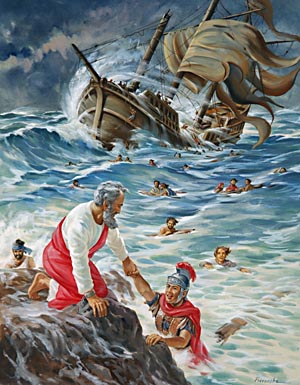Struggling with suffering and pain: Paul's response
I have always been struck by Saul’s testimony of what he endured as a God-sent apostle of Jesus. In an effort to defend his apostleship in the face of certain persons at Corinth who claimed otherwise, Saul retorted that he was just as Jewish and Christian as any other leader.
 “22 Are they Hebrews? So am I. Are they Israelites? So am I. Are they offspring of Abraham? So am I. 23 Are they servants of Christ? I am a better one- I am talking like a madman- with far greater labors, far more imprisonments, with countless beatings, and often near death. 24 Five times I received at the hands of the Jews the forty lashes less one. 25 Three times I was beaten with rods. Once I was stoned. Three times I was shipwrecked; a night and a day I was adrift at sea; 26 on frequent journeys, in danger from rivers, danger from robbers, danger from my own people, danger from Gentiles, danger in the city, danger in the wilderness, danger at sea, danger from false brothers; 27 in toil and hardship, through many a sleepless night, in hunger and thirst, often without food, in cold and exposure. 28 And, apart from other things, there is the daily pressure on me of my anxiety for all the churches.” (2 Cor. 11, ESV)
“22 Are they Hebrews? So am I. Are they Israelites? So am I. Are they offspring of Abraham? So am I. 23 Are they servants of Christ? I am a better one- I am talking like a madman- with far greater labors, far more imprisonments, with countless beatings, and often near death. 24 Five times I received at the hands of the Jews the forty lashes less one. 25 Three times I was beaten with rods. Once I was stoned. Three times I was shipwrecked; a night and a day I was adrift at sea; 26 on frequent journeys, in danger from rivers, danger from robbers, danger from my own people, danger from Gentiles, danger in the city, danger in the wilderness, danger at sea, danger from false brothers; 27 in toil and hardship, through many a sleepless night, in hunger and thirst, often without food, in cold and exposure. 28 And, apart from other things, there is the daily pressure on me of my anxiety for all the churches.” (2 Cor. 11, ESV)
And from my experience in dealing with Christians for twenty years, I know I’m not alone. Many, many other Christians also expect following Jesus to bring health, luxury, ease, and prosperity. One can easily think of several popular authors and speakers who advocate such nonsense.
 “. . . Christ Jesus is the one who died- more than that, who was raised- who is at the right hand of God, who indeed is interceding for us. 35 Who shall separate us from the love of Christ? Shall tribulation, or distress, or persecution, or famine, or nakedness, or danger, or sword? 36 As it is written, “For your sake we are being killed all the day long; we are regarded as sheep to be slaughtered.” 37 No, in all these things we are more than conquerors through him who loved us. 38 For I am sure that neither death nor life, nor angels nor rulers, nor things present nor things to come, nor powers, 39 nor height nor depth, nor anything else in all creation, will be able to separate us from the love of God in Christ Jesus our Lord.” (Rom 8:34-39, ESV)
“. . . Christ Jesus is the one who died- more than that, who was raised- who is at the right hand of God, who indeed is interceding for us. 35 Who shall separate us from the love of Christ? Shall tribulation, or distress, or persecution, or famine, or nakedness, or danger, or sword? 36 As it is written, “For your sake we are being killed all the day long; we are regarded as sheep to be slaughtered.” 37 No, in all these things we are more than conquerors through him who loved us. 38 For I am sure that neither death nor life, nor angels nor rulers, nor things present nor things to come, nor powers, 39 nor height nor depth, nor anything else in all creation, will be able to separate us from the love of God in Christ Jesus our Lord.” (Rom 8:34-39, ESV)
 “22 Are they Hebrews? So am I. Are they Israelites? So am I. Are they offspring of Abraham? So am I. 23 Are they servants of Christ? I am a better one- I am talking like a madman- with far greater labors, far more imprisonments, with countless beatings, and often near death. 24 Five times I received at the hands of the Jews the forty lashes less one. 25 Three times I was beaten with rods. Once I was stoned. Three times I was shipwrecked; a night and a day I was adrift at sea; 26 on frequent journeys, in danger from rivers, danger from robbers, danger from my own people, danger from Gentiles, danger in the city, danger in the wilderness, danger at sea, danger from false brothers; 27 in toil and hardship, through many a sleepless night, in hunger and thirst, often without food, in cold and exposure. 28 And, apart from other things, there is the daily pressure on me of my anxiety for all the churches.” (2 Cor. 11, ESV)
“22 Are they Hebrews? So am I. Are they Israelites? So am I. Are they offspring of Abraham? So am I. 23 Are they servants of Christ? I am a better one- I am talking like a madman- with far greater labors, far more imprisonments, with countless beatings, and often near death. 24 Five times I received at the hands of the Jews the forty lashes less one. 25 Three times I was beaten with rods. Once I was stoned. Three times I was shipwrecked; a night and a day I was adrift at sea; 26 on frequent journeys, in danger from rivers, danger from robbers, danger from my own people, danger from Gentiles, danger in the city, danger in the wilderness, danger at sea, danger from false brothers; 27 in toil and hardship, through many a sleepless night, in hunger and thirst, often without food, in cold and exposure. 28 And, apart from other things, there is the daily pressure on me of my anxiety for all the churches.” (2 Cor. 11, ESV)
This text has always struck me because it keeps my theology of suffering and pain and God’s will in check. I know I struggle with understanding God through pain and suffering at times because I’m a Western, rich, white person. It is. Of course other races can struggle with this issue, but if I were born in so many other parts of the world, I wouldn’t ever assume that God owes me. Of course He doesn’t. He doesn’t owe me anything. The world doesn’t owe me anything.
Like the students I’ve taught for two years in high school, I have traces—yes, I hope just traces—of “entitledism.”


And from my experience in dealing with Christians for twenty years, I know I’m not alone. Many, many other Christians also expect following Jesus to bring health, luxury, ease, and prosperity. One can easily think of several popular authors and speakers who advocate such nonsense.
Any Christian who knows the teachings of Jesus should already have expected profound struggling. He says it over and over: “For the gate is narrow and the way is hard that leads to life, and those who find it are few.” (Matt 7:14); Or, after having taught his disciples how they must eat His body and drink His blood to live, His disciples said, “This is a hard saying; who can listen to it?” (Jn 6:60). In fact, because of Jesus’ teaching, “many of his disciples turned back and no longer walked with him” (Jn 6:66). And we can’t forget that not one single disciple or Apostle went to the cross with Him. I don’t think I could have either. I’d much prefer to keep that whole “pick up your cross” thing metaphorical.
Nevertheless, though I should have expected it, I still reread Saul’s struggle in his ministry and shake my head. Go back and read it. See how many times Saul was in “danger”! Doesn’t God love him? Isn’t God good? Why would God let him, indeed, inspire him, to do things that would lead to constant, “daily pressure,” threats, and anxiety?
I’ve never been stoned. I’ve never been beaten. I’ve never been shipwrecked. Never. So what in the world do I have to complain about? Of course, some things are worth complaining about. Some things are not minor.
So, what do I do when struggling with pain and suffering? I read what Saul said in Romans.
It’s the last part that is so striking to me. Nothing “will be able to separate us from the love of God in Christ Jesus our Lord.” From the “love of God.” I still, after having read this for years, expect Saul to say that nothing would separate us from God’s rewards or redemption or rescue or saving or payback. Nope. God’s love. I expected God’s material restoration or perhaps a vacation, but not God’s “love.”
Then it hits me. The greatest danger for us is to interpret our suffering and pain as a sign that God no longer loves us.
Your husband left you? It doesn’t separate you from the love of God. Your wife left you? It doesn’t separate you from the love of God. Your child died? It doesn’t separate you from the love of God. You lost your job? It doesn’t separate you from the love of God. You lost your house? It doesn’t separate you from the love of God. You lost that relationship you really enjoyed? It doesn’t separate you from the love of God. You lost your health? It doesn’t separate you from the love of God.
Losing His love would be the biggest loss we could experience. And we haven’t lost it. You haven’t lost it. I haven’t lost it.
I think Saul would stare us in the face and say to whatever it is we go through: “He still loves you. You and I are ‘still conquerors through Him who loved us.’ Don’t give up. Life can be extremely hard. But ‘this slight momentary affliction is preparing for us an eternal weight of glory beyond all comparison, as we look not to the things that are seen but to the things that are unseen. For the things that are seen are transient, but the things that are unseen are eternal.’ (2 Cor 4:17-18). Just don’t ever think that God stopped loving you because you’re experiencing pain and loss. That’s not how God operates.”
Nothing separates us from His love. How do we know that? Because that’s the very character of God. It’s seen in the ministry, death, and resurrection of Jesus. And Saul avers that Jesus “is at the right hand of God, . . . interceding for us.”
Bottomline? God is still very active and purposive in the life of His disciples. We cannot allow our experience of pain to dictate our theology.

